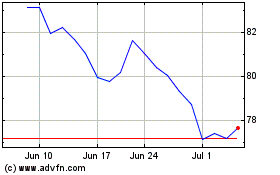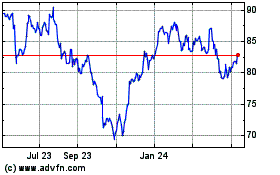Analysis Shows Positive Association Between Cardiac Resynchronization Therapy and Patients' Increased Adherence to Heart Fail...
September 19 2016 - 9:30AM


DUBLIN and ORLANDO, Fla. - Sept.
19, 2016 - Medtronic plc (NYSE:MDT) announced the results of an
analysis that reveals patients increasingly adhere to heart failure
medications after they receive cardiac resynchronization therapy
(CRT) devices. The analysis of more than 4,500 patients
revealed that compliance with their medications increased 67
percent 24 months after receiving their CRT implants, compared to
the 24 months prior to implant (p<0.001). The results were
presented at the 2016 Heart Failure Society of America (HFSA)
Scientific Meeting in Orlando, Fla.
CRT is a proven treatment for select patients with
heart failure, and in combination with optimal medical therapy has
been shown to further reduce patients' symptoms and extend their
survival. Patients' adherence to medication is a major component of
heart failure self-management, and commonly prescribed therapies
include angiotensin-converting enzyme inhibitors (ACE-I) or
angiotensin receptor blockers (ARB), beta-blockers (BB), direct
renin inhibitors (DRI), and diuretics for patients with heart
failure and a reduced ejection fraction. Additionally, for heart
failure patients whose hearts pump out of sync, professional
medical guidelines recommend cardiac resynchronization
therapy-pacemakers (CRT-P) or -defibrillators (CRT-D).
The retrospective analysis used administrative
claims data from 4,512 patients, younger than 65 years old, who
received CRT devices between January 2008 and December 2014.
Patients' adherence to a regimen of guideline-recommended
medication classes (diuretic, ACE-I, ARB, BB, aldosterone
antagonist, digoxin, and statin) before CRT and after CRT
implantation was assessed using proportion of days covered (PDC),
which measures the availability of all prescribed medications
simultaneously in these patients' homes.
The number of patients considered fully compliant
with their medication regimens (PDC >= 80 percent) nearly
doubled at 12 months following CRT implants. Additionally, the
proportion of compliant patients increased substantially for
individual medication classes at 12 months following CRT implants
(ACE-I at 54.4 percent vs 37.1 percent, BB at 58.2 percent vs 33.9
percent, loop diuretic at 41.8 percent vs 27 percent).
"These data support our commitment to
understanding how we can continue to provide the best solutions for
patients with heart failure," said David Steinhaus, M.D., vice
president and general manager of the Heart Failure business, and
medical director for the Cardiac Rhythm and Heart Failure division
of Medtronic. "With some heart failure patients, CRT is a turning
point in their treatment plan because - in addition to their being
monitored more closely - the severity of their symptoms diminish.
Technology may lead to greater medication compliance, helping heart
failure patients better manage their conditions, while keeping them
out of the hospital and, ultimately, reducing costs for the
healthcare system."
In collaboration with leading clinicians,
researchers and scientists worldwide, Medtronic offers the broadest
range of innovative medical technology for the interventional and
surgical treatment of cardiovascular disease and cardiac
arrhythmias. The company strives to offer products and services of
the highest quality that deliver clinical and economic value to
healthcare consumers and providers around the world.
About Medtronic
Medtronic plc (www.medtronic.com), headquartered
in Dublin, Ireland, is among the world's largest medical
technology, services and solutions companies - alleviating pain,
restoring health and extending life for millions of people around
the world. Medtronic employs more than 88,000 people worldwide,
serving physicians, hospitals and patients in approximately 160
countries. The company is focused on collaborating with
stakeholders around the world to take healthcare Further,
Together.
Any forward-looking statements
are subject to risks and uncertainties such as those described in
Medtronic's periodic reports on file with the Securities and
Exchange Commission. Actual results may differ materially from
anticipated results.
-end-
Contacts:
Tracy McNulty
Public Relations
+1-763-526-2492
Ryan Weispfenning
Investor Relations
+1-763-505-4626
This
announcement is distributed by Nasdaq Corporate Solutions on behalf
of Nasdaq Corporate Solutions clients.
The issuer of this announcement warrants that they are solely
responsible for the content, accuracy and originality of the
information contained therein.
Source: Medtronic plc via Globenewswire
Medtronic (NYSE:MDT)
Historical Stock Chart
From Mar 2024 to Apr 2024

Medtronic (NYSE:MDT)
Historical Stock Chart
From Apr 2023 to Apr 2024
